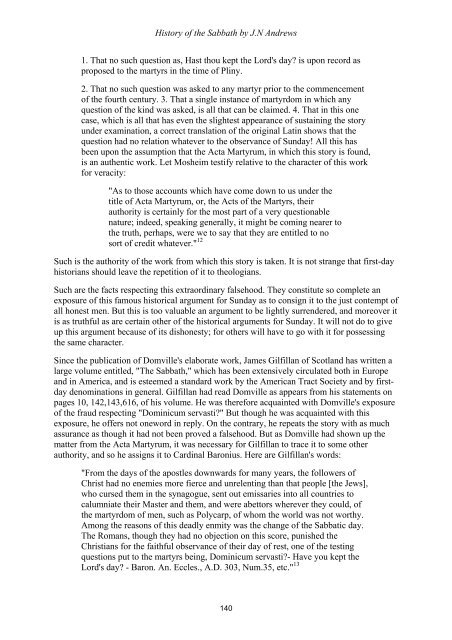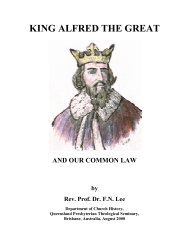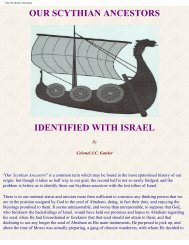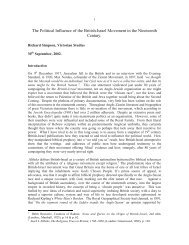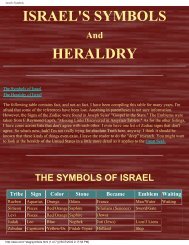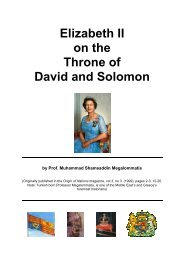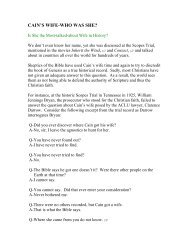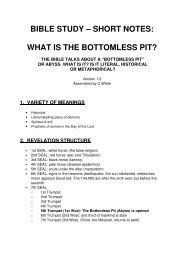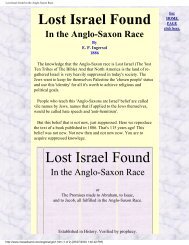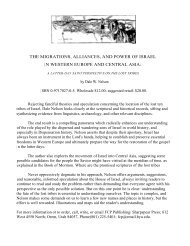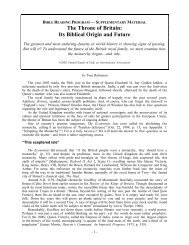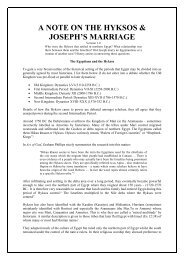HISTORY OF THE SABBATH - Friends of the Sabbath Australia
HISTORY OF THE SABBATH - Friends of the Sabbath Australia
HISTORY OF THE SABBATH - Friends of the Sabbath Australia
Create successful ePaper yourself
Turn your PDF publications into a flip-book with our unique Google optimized e-Paper software.
History <strong>of</strong> <strong>the</strong> <strong>Sabbath</strong> by J.N Andrews1. That no such question as, Hast thou kept <strong>the</strong> Lord's day? is upon record asproposed to <strong>the</strong> martyrs in <strong>the</strong> time <strong>of</strong> Pliny.2. That no such question was asked to any martyr prior to <strong>the</strong> commencement<strong>of</strong> <strong>the</strong> fourth century. 3. That a single instance <strong>of</strong> martyrdom in which anyquestion <strong>of</strong> <strong>the</strong> kind was asked, is all that can be claimed. 4. That in this onecase, which is all that has even <strong>the</strong> slightest appearance <strong>of</strong> sustaining <strong>the</strong> storyunder examination, a correct translation <strong>of</strong> <strong>the</strong> original Latin shows that <strong>the</strong>question had no relation whatever to <strong>the</strong> observance <strong>of</strong> Sunday! All this hasbeen upon <strong>the</strong> assumption that <strong>the</strong> Acta Martyrum, in which this story is found,is an au<strong>the</strong>ntic work. Let Mosheim testify relative to <strong>the</strong> character <strong>of</strong> this workfor veracity:"As to those accounts which have come down to us under <strong>the</strong>title <strong>of</strong> Acta Martyrum, or, <strong>the</strong> Acts <strong>of</strong> <strong>the</strong> Martyrs, <strong>the</strong>irauthority is certainly for <strong>the</strong> most part <strong>of</strong> a very questionablenature; indeed, speaking generally, it might be coming nearer to<strong>the</strong> truth, perhaps, were we to say that <strong>the</strong>y are entitled to nosort <strong>of</strong> credit whatever." 12Such is <strong>the</strong> authority <strong>of</strong> <strong>the</strong> work from which this story is taken. It is not strange that first-dayhistorians should leave <strong>the</strong> repetition <strong>of</strong> it to <strong>the</strong>ologians.Such are <strong>the</strong> facts respecting this extraordinary falsehood. They constitute so complete anexposure <strong>of</strong> this famous historical argument for Sunday as to consign it to <strong>the</strong> just contempt <strong>of</strong>all honest men. But this is too valuable an argument to be lightly surrendered, and moreover itis as truthful as are certain o<strong>the</strong>r <strong>of</strong> <strong>the</strong> historical arguments for Sunday. It will not do to giveup this argument because <strong>of</strong> its dishonesty; for o<strong>the</strong>rs will have to go with it for possessing<strong>the</strong> same character.Since <strong>the</strong> publication <strong>of</strong> Domville's elaborate work, James Gilfillan <strong>of</strong> Scotland has written alarge volume entitled, "The <strong>Sabbath</strong>," which has been extensively circulated both in Europeand in America, and is esteemed a standard work by <strong>the</strong> American Tract Society and by firstdaydenominations in general. Gilfillan had read Domville as appears from his statements onpages 10, 142,143,616, <strong>of</strong> his volume. He was <strong>the</strong>refore acquainted with Domville's exposure<strong>of</strong> <strong>the</strong> fraud respecting "Dominicum servasti?" But though he was acquainted with thisexposure, he <strong>of</strong>fers not oneword in reply. On <strong>the</strong> contrary, he repeats <strong>the</strong> story with as muchassurance as though it had not been proved a falsehood. But as Domville had shown up <strong>the</strong>matter from <strong>the</strong> Acta Martyrum, it was necessary for Gilfillan to trace it to some o<strong>the</strong>rauthority, and so he assigns it to Cardinal Baronius. Here are Gilfillan's words:"From <strong>the</strong> days <strong>of</strong> <strong>the</strong> apostles downwards for many years, <strong>the</strong> followers <strong>of</strong>Christ had no enemies more fierce and unrelenting than that people [<strong>the</strong> Jews],who cursed <strong>the</strong>m in <strong>the</strong> synagogue, sent out emissaries into all countries tocalumniate <strong>the</strong>ir Master and <strong>the</strong>m, and were abettors wherever <strong>the</strong>y could, <strong>of</strong><strong>the</strong> martyrdom <strong>of</strong> men, such as Polycarp, <strong>of</strong> whom <strong>the</strong> world was not worthy.Among <strong>the</strong> reasons <strong>of</strong> this deadly enmity was <strong>the</strong> change <strong>of</strong> <strong>the</strong> Sabbatic day.The Romans, though <strong>the</strong>y had no objection on this score, punished <strong>the</strong>Christians for <strong>the</strong> faithful observance <strong>of</strong> <strong>the</strong>ir day <strong>of</strong> rest, one <strong>of</strong> <strong>the</strong> testingquestions put to <strong>the</strong> martyrs being, Dominicum servasti?- Have you kept <strong>the</strong>Lord's day? - Baron. An. Eccles., A.D. 303, Num.35, etc." 13140


